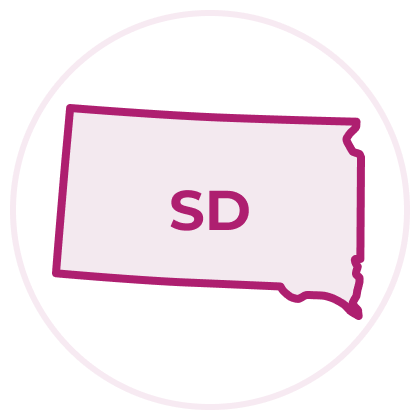Pre-Service Training
Prospective foster and adoptive parents receive 30 hours of pre-service training using the state’s Foster and Adoptive Parent Training curriculum. If they prefer, families can choose to take Extending Our Families Through UNITY, a 30-hour curriculum that is based on traditions and cultures of Indian people. It is designed to address issues Native American foster parents have identified as important and to prepare current and potential foster parents for their critical role as caregivers for Indian children.
Services Offered Through the State’s Post-Permanency Support Program
Post-permanency services in South Dakota are provided for adoptive families through a contract with a private provider. In fiscal year 2025, South Dakota enhanced its post-permanency services and began to offer them statewide. (Previously, services were mostly limited to case management and therapy in two areas.)
Services include:
In 2023, the previous post-adoption service provider, served 37 youth and 24 families.
Geographic Area Covered
Post-adoption services are offered statewide. Services can be provided in person, by phone, or virtually. Services will be provided virtually for families who prefer this method of interaction.
Eligible Population for the Overall Post-Permanency Program
Variations in Eligibility for the Post-Permanency Program
Private, intercountry and families who adopted from foster care in other states, territories, or tribes can access support groups, resource referrals and trainings.
Outreach and Engagement
The state’s Adoption Program Specialist reaches out to families 30 days after adoption finalization to inform them of the post-adoption program, provide contact information to the post-permanency provider and the Adoption Program Specialist, and to answer any questions the family may have. Families can reach out to the Adoption Program Specialist for follow up contact if needed.
Information about the post-adoption program is shared through the following:
- Post-adoption Facebook group
- Support groups
- Community resource services directory
- A quarterly newsletter
- Emails to families — DSS and the post-permanency provider collaborate to maintain a list of families who have adopted through the child welfare system. The post-permanency provider is responsible for generating and sending informational emails.
- Post Adoption Brochure and DSS Post Adoption Booklet
How the Post-Permanency Program Is Operated
Notes About Who Provides Which Service(s)
The post-permanency provider offers the post-adoption services described above.
The state’s Adoption Program Specialist assists families with applications for funding supports. The Adoption Program Specialist also helps families with referrals to treatment.
Adoption/Guardianship Assistance/Subsidy Review and Changes
Adoptive parents can request a change in the adoption assistance agreement whenever there is a change in the child’s needs. Decisions are made on a case-by-case basis. To request an amendment to the adoption assistance agreement, the adoptive family must submit a written request to their adoption assistance worker. The administrator and the adoption program specialist consider the request for change.
Subsidized guardianship families must submit required review information annually to Child and Family Services to continue receiving a guardianship subsidy.
Tracking Adoption/Guardianship Discontinuity
The Adoption Program Specialist tracks discontinuity on a private document.
Post-Permanency Program Spending (FY 2025)
Funding Sources for the Post-Permanency Program (FY 2023)
- State funds
- Adoption/Guardianship Incentive Program Payments (AIPP)
- Adoption savings (reported on CB 496 Part 4 – Annual Adoption Savings Report)


